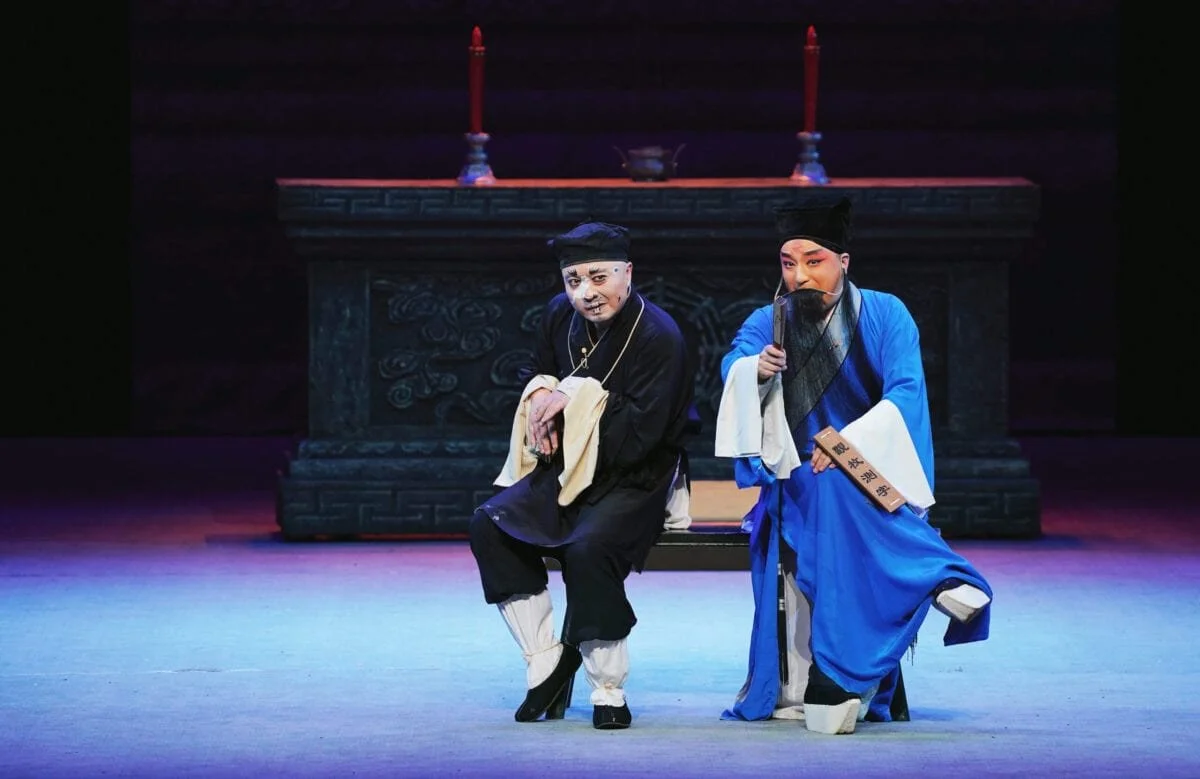The Play That Saved Kunqu: Fifteen Strings of Cash
Fifteen Strings of Cash is more than just a play — it’s a lifeline that kept the time-honoured tradition of Kunqu from slipping into silence in the 20th century.
Sense of Wander: ★★★★☆
Disguised as a fortune teller, the upright official Kuang Zhong (right) cleverly draws the mischievous Lou Ashu (left) into exposing his own crimes. Image courtesy of Zhejiang Kunqu Opera Troupe.
HONG KONG — Kunqu, also known as Kun opera, has long been revered as the “mother of all operas” in China. Yet in its more than 600-year history, there was a time when this elegant art form was on the verge of disappearing.
From the mid-Qing dynasty (1644–1912) onward, Kunqu’s delicate melodies and refined movements were increasingly overshadowed by the rise of regional operas — most notably Peking opera, which captured the hearts of audiences and took over Kunqu’s place as the leading theatrical form.
By the 1950s, only a handful of masters, including Zhou Chuanying and Wang Chuansong, continued to carry the Kunqu tradition, while the sole remaining troupe of forty-eight performers struggled to survive. No Kunqu performances could be found in Beijing nor Shanghai, and many in cultural and theatrical circles dismissed it as a relic of the past — beautiful but doomed to fade.
In 1956, a remarkable turn of events took place breathed new life into this vashing art. The Zhejiang Kunqu Opera Troupe brought the newly adapted Fifteen Strings of Cash — known in Chinese as Shiwuguan — to Beijing. The performance caused a nationwide sensation: it drew praise from leaders including Mao Zedong and Zhou Enlai, ran for 46 consecutive shows, and attracted more than 70,000 spectators.
The play became the talk of the city, and Kunqu, once teetering on the brink of extinction, was suddenly restored to prominence. People’s Daily celebrated the achievement in an editorial, calling it “a single play that revived an entire operatic genre,” sparking the resurgence of Kunqu troupes across China.
Though I had long known of this legendary play, which marked a turning point in the history of Chinese opera, I had never seen it performed — until recently.
Innocent merchant Xiong Youlan finds himself condemned for a crime he never committed. Image courtesy of Zhejiang Kunqu Opera Troupe.
Fifteen Strings of Cash was adapted from the Qing-dynasty play Dream of Two Bears, itself drawn from Feng Menglong’s classic collection Stories to Awaken the World. Unlike the romantic tales often associated with Kunqu — most famously The Peony Pavilion — this play is a story of crime, justice, and truth, told with a touch of humor.
The story opens with a butcher’s murder, placing suspicion on his adoptive daughter, Su Xujuan, and an innocent man, Xiong Youlan. Xiong is found in possession of fifteen strings of cash — the very sum believed stolen from the victim. Hasty officials, eager to close the case, condemn Xiong and Su, convinced the latter helped plan an elopement and colluded in the crime.
Just as Xiong and Su inch were inches from execution, the upright official Kuang Zhong intervenes, risking his position to hear their plea. Through careful investigation, Kuang uncovers the truth: the money Xiong carries was payment for work, and the real culprit lurks elsewhere.
Through wit and insight, Kuang Zhong brings Lou Ashu’s schemes to light, restoring justice. Image courtesy of Zhejiang Kunqu Opera Troupe.
That culprit is Lou Ashu — a trickster whose schemes drive the play’s tension. Yet Lou Ashu — Ashu, meaning “rat,” hints at his sneaky nature — is no one-dimensional villain; he is also the comic heartbeat of the play.
He manipulates the first court ruling, shifts blame onto the innocent, and in doing so exposes the darker impulses every human carries. At the same time, his exaggerated gestures, sly antics, and witty remarks draw laughter from the audience, turning the courtroom’s tension into theatrical delight.
In contrast, Kuang Zhong embodies integrity and reason, illustrating that justice must be guided by truth rather than appearances or expedience. The interplay between these two forces — chaos and order, jest and justice — is what gives Fifteen Strings of Cash its charm.
For me, the play is a perfect blend of justice and wit, reminiscent of other operatic works such as the Peking opera Xu Jiujing: Rise in the Officialdom, which I explored in my article A Peking Opera Classic’s Guide to Surviving Office Politics.
It’s worth noting that what makes this performance even more meaningful is that it was staged by the Zhejiang Jingkun Arts Centre, established in 2019 through the joining of the Zhejiang Kunqu Opera Troupe and the Zhejiang Peking Opera Troupe — the former being the very troupe that first performed this adapted play nearly 70 years ago.
It is heartening to see that Fifteen Strings of Cash, now a cornerstone of modern Kunqu history, continues to be passed down through generations, celebrated as a timeless classic that no opera fan should miss.
Wanderer’s tips — A 2003 recording of Fifteen Strings of Cash by the Shanghai Kunqu Opera Troupe is available on Youtube here (note: no English subtitles).
As part of the 2025 Chinese Culture Festival, Fifteen Strings of Cash was staged at the Ko Shan Theatre in Hong Kong on August 15, 2025.



